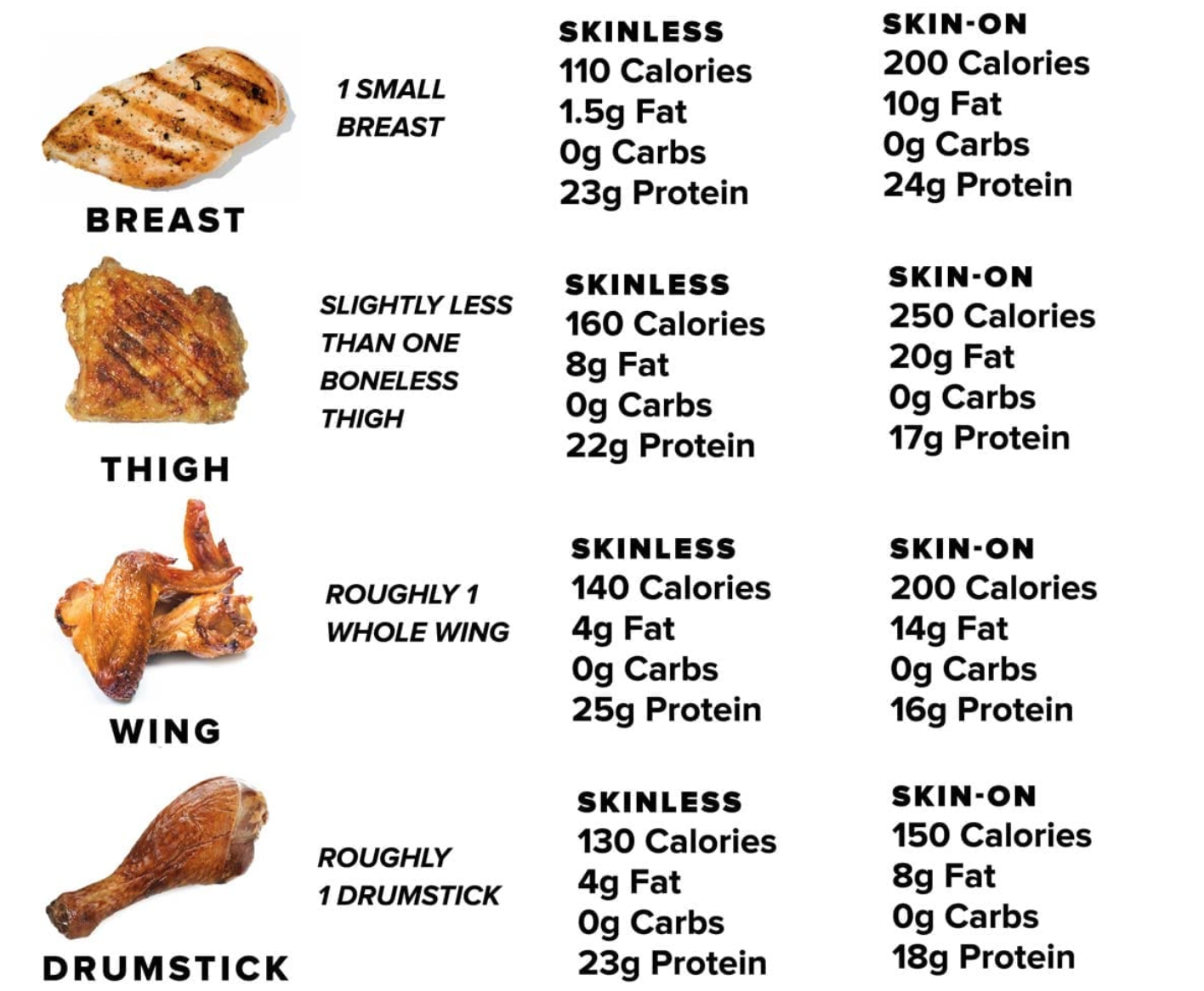Have you ever wondered exactly how much protein you’re getting when you cook up a whole chicken? I’ve been there too, staring at that roasted bird and trying to guess my protein intake. Let’s cut through the confusion and get to the meaty facts!
The Short Answer
A whole roasted chicken typically contains between 250-300 grams of protein depending on its size. For a standard 3.5-pound (1.6 kg) whole roasted chicken you can expect approximately 275 grams of protein.
But there’s more to the story than just one number…
Protein Content by Chicken Part
The protein isn’t distributed evenly throughout the chicken Here’s how it breaks down per 100 grams of each part
| Chicken Part | Protein (g) per 100g |
|---|---|
| Breast | 31-32 |
| Thigh | 25-26 |
| Drumstick | 24 |
| Wing | 24 |
This means the breast meat gives you the biggest protein punch, while other parts offer slightly less but still impressive amounts.
Factors That Affect Protein Content
Several things can influence exactly how much protein your whole chicken contains
- Size matters: Bigger chickens = more protein (obvious, but important!)
- Cooking method: Roasting concentrates protein as moisture evaporates
- Breed and feed: Minor differences exist between chicken varieties
- With or without skin: Skin adds minimal protein but significant fat
Breaking Down a Typical Whole Chicken
Let me walk you through what you’re actually getting with a standard whole chicken:
For a 3.5-pound (1.6 kg) cooked chicken:
- Approximately 275g total protein
- Highest concentration in the breast meat
- Lower but still significant amounts in thighs, wings, and drumsticks
I’ve found that when I’m meal prepping, knowing these numbers helps me accurately track my protein intake throughout the week when I divide up the chicken.
Chicken vs. Other Protein Sources
If you’re wondering how chicken stacks up against other protein sources, here’s a quick comparison:
- Chicken: High protein, relatively low fat (especially breast)
- Beef: Comparable protein but typically higher fat content
- Fish: Similar protein levels, fat content varies by species
- Plant proteins: Generally lower protein density than chicken
This is why chicken is such a staple for fitness enthusiasts and people watching their macros!
How to Accurately Measure Protein in Your Chicken
Want to know exactly how much protein is in YOUR chicken? Here’s my method:
- Debone the chicken completely
- Separate meat from bones and skin
- Weigh the edible meat portions
- Use these calculations:
- Breast meat: multiply weight in grams × 0.31
- Thigh meat: multiply weight in grams × 0.26
- Other parts: multiply weight in grams × 0.24
- Add it all up for total protein
It’s a bit of work, but gives you the most accurate number!
Practical Tips for Protein Consumption
A whole chicken offers LOTS of protein, but that doesn’t mean you should eat it all at once. Here’s what I’ve learned:
- Spread it out: Your body can only efficiently process around 20-30g of protein at a time
- Meal prep is your friend: Divide the chicken into portions for multiple meals
- Storage matters: Freezing cooked chicken preserves protein content perfectly
Best Ways to Cook a Whole Chicken for Maximum Nutrition
I’ve tried pretty much every chicken cooking method, and these preserve nutrition best:
- Roasting: My go-to method that retains moisture and flavor
- Baking: Similar to roasting with even cooking
- Grilling: Allows fat to drip away
- Poaching/Boiling: Low-fat option that keeps moisture
Avoid deep frying if you’re focused on health – it adds unnecessary fat that masks the lean protein benefits.
Why Chicken is a Protein Superstar
There are so many reasons chicken deserves its protein-rich reputation:
- Complete protein: Contains all essential amino acids
- Super versatile: Can be prepared countless ways
- Cost-effective: Often cheaper than other animal proteins
- Accessible: Available pretty much everywhere
When I’m watching my budget but still want quality protein, chicken is always my first choice.
FAQ About Chicken Protein
Does cooking affect protein content?
Cooking doesn’t destroy protein, but it can concentrate it as moisture evaporates. That’s why cooked chicken has more protein per 100g than raw chicken.
Is organic chicken higher in protein?
The difference in protein between organic and conventional chicken is negligible. The main differences are in farming practices and potential contaminants.
Does chicken skin contain protein?
Chicken skin contains minimal protein. It’s mostly fat, so removing it significantly reduces fat content without greatly affecting protein.
Can I freeze cooked chicken without losing protein?
Absolutely! Freezing preserves protein content perfectly. Just make sure to use airtight containers to prevent freezer burn.
The Bottom Line
A whole chicken gives you around 250-300 grams of high-quality protein, with the highest concentration in the breast meat. This makes it an excellent choice for anyone focused on increasing their protein intake.
Whether you’re meal prepping for the week, feeding a family, or just love a good roast chicken dinner, now you know exactly what protein punch you’re getting!
Remember that while the protein content is impressive, the way you prepare your chicken matters too. Stick to healthier cooking methods like roasting, baking, or grilling to keep your chicken as nutritious as possible.
What’s your favorite way to prepare a whole chicken? I’d love to hear about it in the comments!

1 whole chicken (695 g) of Whole Roasted Chicken contains 1202 calories (kcal), 50 g fat, 6.0 g carbs and 168.0 g protein.QuantityServing
Log this food in Fitia
Get your calorie requirement
Log your nutrition in seconds
Get a personalized nutrition plan
